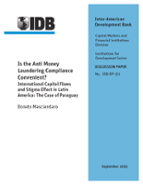Is the Anti Money Laundering Compliance Convenient?: International Capital Flows and Stigma Effect in Latin America: The Case of Paraguay
Date
Sep 2013
This study analyzes the international financial flows of Latin America in order to verify existence and direction of the Stigma Effect. Is the AML/CFT financial regulation that addresses the money laundering and terrorism finance phenomena relevant in shaping the pattern of international banking movements? We test if the FAFT listing-delisting events are effective sticks and carrots for the targeted countries in influencing cross-border banking flows. The tests are based on a theoretical framework, where the stigma effect holds if doing business with a listed country produces nonlinear monetary and/or reputational costs. We focus on the 34 Latin American countries in the period 1996-2007 using annual panel data. We find evidence that the list in-list out mechanism can influence the banking inflows, provided that some conditions hold. The relevance of the stigma effect seems to depend on the one side on the efficiency of the international capital markets and on the other side on specific features of the listed/delisted country: regulatory lightness, banking profitability, growth per capita. The empirical specification is applied in evaluating the case of Paraguay using a time series analysis with quarterly data. The study finds that the Paraguayan listing episode was likely to produce perceptible effects on both capital inflows and outflows.



